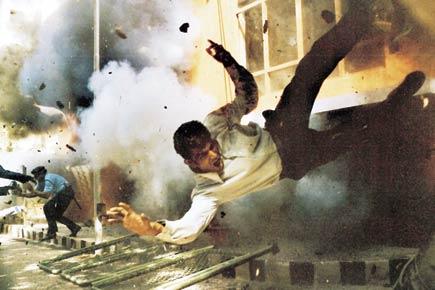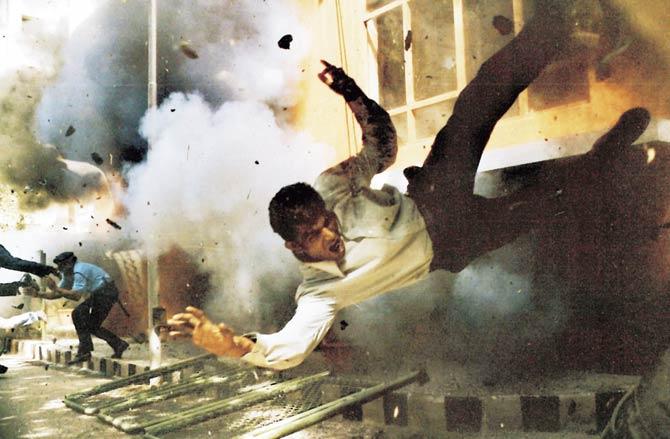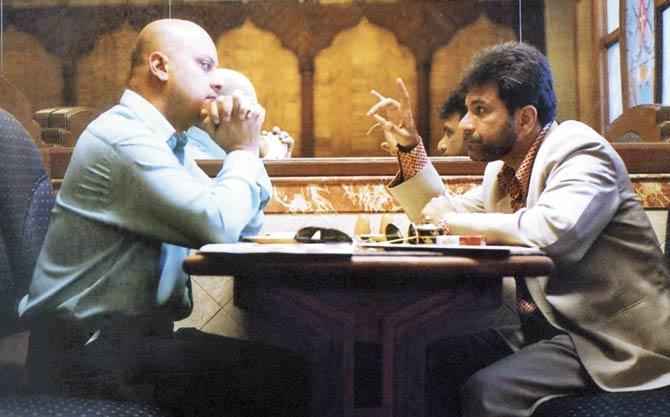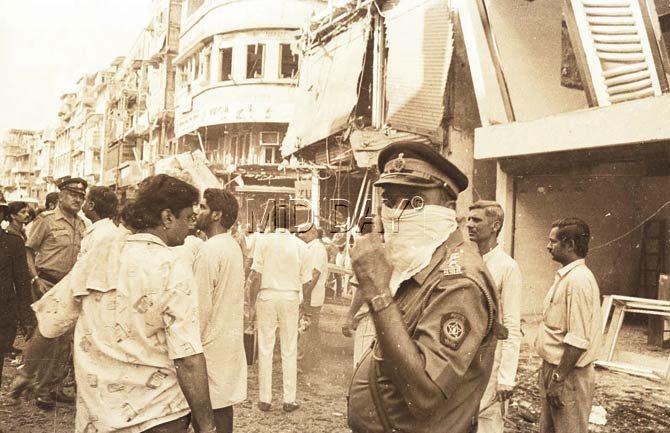How Yakub Memon in a TV interview used the opportunity to tell the world that apart from Tiger Memon, the other Memons were decent, law-abiding citizens

Excerpts from S Hussain Zaidi's 'Black Friday' Chapter 13, Pages 229- 241
By the time Yaqub Abdul Razak Memon, the third of the Memon brothers, was in his early thirties, he had already acquired the reputation of being the best read and smartest criminal that the Bombay police had ever known. But Yaqub's story was unusual. Educated in English-medium schools and college, he graduated with a degree in commerce. He became a chartered accountant in 1990. His accountancy firm was quickly successful, and in 1992 he won an award for the best chartered accountant in the Memon community.
ADVERTISEMENT

A still from the film Black Friday (produced by mid-day) depicting the serial blasts that rocked Mumbai
In 1991, he launched an accounting firm called Mehta and Memon Associates, with his childhood friend Chetan Mehta. Later there was a third partner: a fellow accountancy student Ghulam Bhoira. When this firm closed down in 1992 Yaqub started another called AR & Sons. He also set up an export firm, Tejareth International, with its office at Samrat Cooperative Society, Mahim, to export meat to the Middle East.

Pavan Malhotra (right) essayed the role of Tiger Memon in the film
So great was Yaqub's financial success that he bought six flats in the Al-Hussaini building, Mahim, where Tiger owned two duplex flats. In the same year, he married Raheen in a lavish ceremony at the Islam Gymkhana, and many people from the film world attended the wedding. He and Tiger were dimetrically opposed to each other in nature. One had no compunctions about making money by illegal means; the other was suave, educated and successful through legitimate means.

The blast site at Zaveri Bazar on March 12, 1993. Pic/mid-day archives
It was Yaqub's well-known financial acumen that made the investigators suspect his involvement in the blasts case. During the investigations, it was found that complex financial transactions had taken place through several of Tiger's accounts, and the police assumed that Yaqub must have organized these.
The crime branch alleged that Yaqub had remitted Rs 21,90,000 to Samir Hingora and Hanif Kadawala on 13 March 1993 to distribute to the other accused. The payment was supposedly arranged over the phone so that there were no records. During their search of the Memon flats in Al-Hussaini, the police had come across documents that showed that the family had four NRI accounts at the Turner Road, Bandra, branch of the Hong Kong and Shanghai Banking Corporation (HSBC).
The accounts were in the names of Tiger's brother Ayub Memon (account number 11679297-07), his wife Reshma Memon (account number 11679813-07), Tiger's brother Suleiman's wife Rubina Memon (account number 11979321-07) and Tiger's wife Shabana Memon (account number 11679305-07). The police said that $61,700 was deposited in cash in the British Bank of Middle East, Dubai, from there it was transferred to Marine Midland Bank in New York, USA, and then to these accounts in HSBC.
They suspected that this was an attempt to conceal the source of the money. Yaqub had the authority to handle the accounts of the entire family and they suspected that he had used this money to pay various people, including his own company. Since the entire amount was tendered at the British Bank of the Middle East in Dubai, the police thought that somebody had financed the operation, fully or at least partly, from abroad.
The police also discovered that between December 1992 and March 1993, various accounts at the Mahim branch of the Development Cooperative Bank in the names of Tejareth International and Al-Taj Exports as well as the personal accounts of the Memon family showed heavy cash transactions. The balance in all these accounts on 12 March stood at meagre amounts. Clearly the accounts had been emptied prior to the blasts.
All this careful financial planning made the investigators conclude that Yaqub Memon must have been involved. Accordingly, in December 1993, a reward of Rs 5 lakh was offered for anyone who had information about his whereabouts. On the morning of 21 July 1994, a well-dressed businessman carrying a Pakistani passport in the name of Yusuf Mohammed Ahmed sauntered through Tribhuvan International Airport, Kathmandu.
He had just got off the PIA 250 flight from Karachi. Though he looked serene, Yaqub Memon's mind was in turmoil. For the last seventeen months, he and his family had been on the run, and the life of a fugitive was wearing him down. Yaqub took a taxi to Karnoli Hotel, accompanied by his cousin, Usman, who had come to receive him. They stayed at the hotel for three days. It was a time for introspection.
The Memon family had been in Dubai on 12 March 1993. The Indian government had been putting pressure on the UAE government to repatriate them. Initially, the UAE denied the Memons were there, but eventually requested them to leave. In early April, an ISI agent escorted the family to Karachi. Each person was supplied with a Pakistani passport and a national identity card.
Meanwhile, the Indian government had received information that the Memons were in Karachi and asked the United Nations, the US and various European countries to support their request to Pakistan that the Memons be handed over. Therefore, on 15 April the Memons, escorted by four ISI commandos, took a Thai Airways flight to Bangkok, where they were accommodated in a spacious bungalow on Pattaya Road.
It was virtually house arrest, as they were not allowed to leave the bungalow and were under constant surveillance. After twelve days, the protests by the Memon family grew so intense that they were brought back to Karachi again. They were housed in the Karachi Development Scheme area, popularly known as the Defence Colony and predominantly inhabited by army officials and personnel. This was a high security zone and meant that the Memons were virtually untraceable.
Since then things had been better. Yaqub had gone to Dubai for a week on his Pakistani passport, though always trailed by ISI men. He realized that for his family, there would never be true freedom again. There were two choices before him: he could live with this polite imprisonment by Pakistan, or he could go back to India, face a trial and try to clear his name. These were the options he had come to Kathmandu to try and think about.
He decided that the best option for him was to try to make a deal with the Indian government and convince them that the rest of the Memon family was innocent. It was better to try to go back to their old lives rather than live at the mercy of the Pakistan authorities, as tales of the intelligence services killing off those who had outlived their usefulness were legion. He was especially concerned about his parents, who were now old and deserved better, and for his wife Raheen who was due to deliver their child soon. He did not want his child to live his whole life under the shadow of fear.
On 24 July, Yaqub was back at the airport at 8.15 a.m., checking in for the 10.45 a.m. Lufthansa flight LH 765 from Kathmandu to Karachi. At about 9.15 a.m., after he had cleared immigration formalities, he went in for the security check. On opening his briefcase, the officer found two passports belonging to him-Indian and Pakistani-as well as passports of all the other members of his family, a Pakistani national identity card, and a large amount of Pakistani and US currency.
The Nepal police informed Interpol and later New Delhi. The interrogation began at Kathmandu itself, and continued for three days, with both Indian and Nepali police participating, though the latter's involvement was minimal. On 28 July, a blindfolded Yaqub was reportedly dropped off at Sunoli, on the border of UP, at 3 a.m. He was hungry and totally drained of energy. He was taken to Gorakhpur, about two hours by road from Sunoli, and then flown to Delhi in a special plane.
On the plane, Yaqub met Union Home Secretary K. Padmanabhaiah who headed the CBI investigation in Delhi. Until now events had been more or less as Yaqub had scripted them when he placed his two passports in his briefcase. At 4.30 a.m., 5 August, Yaqub Memon approached New Delhi railway station. He was carrying a briefcase and a suitcase, containing various incriminating documents. There are no trains that arrived or departed at that hour, so it was a somewhat odd time to be there.
Four CBI officers along with armed commandos were waiting. They had allegedly been tipped off that a member of the DCompany was out on the prowl. They descended upon Yaqub and whisked him away to the CBI headquarters at Lodi Road. Yaqub Memon was driven to Patiala House in a CBI van, preceded and followed by armed commando vans. He was produced in front of magistrate V.K. Jain, to whom he stated that apart from Tiger Memon, no other member of the Memon family was involved in the blasts.
He denied the CBI account of his arrest. He stated he had been arrested on 24 July, and had been in Delhi since 28 July, where the CBI had interrogated him. The CBI counsel C.S. Sharma and SP Harishchandra Singh however stuck to their story. The proceedings lasted an hour. Yaqub was remanded to CBI custody for thirty days. Yaqub Memon's arrest spread a wave of elation in Bombay.
Speaking to the press on 6 August, Sharad Pawar declared that Memon's arrest proved what he had always known: that Pakistan was involved in the conspiracy. Everyone involved in the investigation was elated, as there had been little development in the case since the filing of the chargesheet. JCP Singh too believed that the documents recovered from Yaqub established Pakistani complicity. With Memon's evidence, it would now be possible to arrest more people involved.
The CBI stated that they had recovered a video cassette from Yaqub, which had footage of the wedding of Taufiq Jaliawala's daughter Rabia at Karachi, where Dawood Ibrahim and members of the ISI were honoured guests. Yaqub was also carrying three audio cassettes on which he had allegedly secretly recorded important conversations that the CBI was now transcribing and analysing.
The media too found renewed interest in the blasts case. All newspapers reported the CBI version, but many carried Yaqub's denial as well. There was also much investigation and speculation about Yaqub's real role.
There was considerable public and media speculation about how Yaqub, despite being under constant ISI surveillance, could fly out of Karachi, carrying incriminating documents. According to one theory, RAW agents had wooed him away; according to another, Benazir Bhutto was behind it as she was seeking to expose the security establishment which was loyal to her arch rival, the previous prime minister Nawaz Sharif.
A third theory was that Dawood Ibrahim had persuaded Yaqub to return to India to delink his name from the conspiracy. The CBI had announced a Rs 15 lakh reward for information about him. In an interview to India Today (31 July 1994) Dawood had said: 'I am in a desperate situation. The Indian government has reduced me to a mouse, one who is trapped and cannot move around freely.'
Dawood's link with the blasts, so far mentioned only in Dawood Phanse's confession, had been reinforced when one of his close aides Usman Gani Mohammed Memon, a hawala operator, had been arrested on 20 July by the anti-terrorist squad of Gujarat police. During interrogation, Usman stated that Dawood had wanted to avenge the killings of innocent Muslims and so acquired and arranged for the shipment of RDX, arms and other explosives from Pakistan to India.
The three hundred pages of Usman's diary contained the names of top businessmen and builders who sought Dawood's help to launder money. This arrest considerably bolstered the CBI's theory that Dawood Ibrahim had masterminded the blasts. During interrogation, Yaqub Memon stubbornly maintained that he had never met Dawood, and named Tiger Memon and Taufiq Jaliawala as the prime movers of the conspiracy.
The fourth theory about the arrest was that Yaqub had actually been on a business trip to Kathmandu and was apprehended while returning to Karachi. Off the record, CBI officials accepted this version. It was also speculated that the CBI had struck a deal with him, which all officials unanimously denied. Yaqub sat in the darkened room and gazed at the ceiling. There was hardly any sound around him, and he felt cut off from the world.
He thought about how his life had changed, of Raheen, who was due to have their first child in the first week of August. It was now 9 August, and he did not know if he was a father yet. He wished passionately that he had not left Bombay on 9 March. They would have undoubtedly faced a lot of trouble, but they would not have been branded traitors. He had now spent twelve days with CBI officers, patiently answering their questions for hours every day. He had celebrated a mournful thirty-second birthday on 30 July.
A CBI officer came to him and told him that he was to give an interview on television. Yaqub looked at him blankly. 'What interview?' The officer grinned broadly. 'You're about to become a celebrity. It will be on the national TV-Doordarshan-and the whole of India is going to watch you.' Yaqub was in half a mind to refuse, when it struck him that he could use this opportunity to let ninety crore of his countrymen know that apart from Tiger Memon, the other Memons were decent, law-abiding citizens. He asked the officer, 'When am I supposed to be on television?'
'We have to go in for a recording now, it will be aired later tonight.' He was escorted to the Doordarshan studio. The programme on which he was being interviewed was Newstrack, a half-hour news analysis show. In response to the questions, he narrated the tale of his journey to Kathmandu, his interception at the airport, and his handing over to the CBI. He stated that it was Tiger Memon and Taufiq Jaliawala who had been the kingpins, and explained how Tiger had been used by the ISI in the plot.
Finally, Yaqub was asked whether he had met Dawood Ibrahim. He denied meeting him, but said that he knew his name. The interview was aired on Doordarshan at 9 p.m. It created a huge sensation, as such an interview was unprecedented in the annals of Indian television. The government's aim had been fulfilled: the world had heard how Pakistan had been involved in the blasts and even now was sheltering its perpetrators.
Many viewers were impressed with Yaqub's courage and intelligence, and intrigued by the discrepancies between the CBI account and Yaqub's. There were eight armed commandos waiting at the arrivals terminal at Indira Gandhi International Airport, New Delhi. Several CBI officers also prowled around, keeping their eyes glued to the main arrival gate. It was 24 August 1994.
Air-India flight 736 from Dubai had already arrived. Soon they saw a group of six adults whose faces looked familiar and who had an uncertain air about them. Suleiman Memon and Isa Memon supported sixty-six-year-old Abdul Razak and sixty-year-old Hanifa. Immediately behind them walked a youth in his twenties, whom they assumed to be Yusuf.
Following him was Suleiman's wife Rubina and their two children, seven-year-old Iliyas and five-year-old Aliyah. Each of the adult male Memons carried a price of Rs 1 lakh, and each of the adult women carried a price of Rs 25,000. Only five adult members of the family were still missing-Tiger and his wife Shabana, Ayub and his wife Reshma, and Yaqub's wife Raheen who had recently delivered. The Memons had travelled to Dubai, where they had contacted the Indian embassy, filed their affidavits and informed the embassy of their intention to return.
The embassy had in turn informed the CBI, and escorted the group to the airport and on to the plane. As the group reached the CBI officers, one of them came forward, introduced himself and told them that they were under arrest. They were taken to a safe house in a central government police colony in south Delhi, guarded by eight ferocious-looking and fully armed commandos. Metropolitan magistrate V.K. Jain remanded them to CBI custody for fourteen days under TADA. The children were allowed to stay with the family. The media had no inkling about these arrests at that time.

Excerpted with permission from Penguin Books India
On 11 September the clan was joined by Raheen and her month-old baby. Raheen too arrived from Dubai, was arrested at the airport and remanded into custody. Many believed that this mass surrender by the Memon family meant that a deal had been struck. The Indian government and the CBI, embarrassed that none of the important people in the conspiracy had been captured, had probably offered the Memons lighter punishment or an acquittal if they returned to India. However, the CBI maintained that there was no deal and the Memons were not planning to turn approvers. Its director, K. Vijay Rama Rao, said that the Memons had surrendered because they had had no other option.
 Subscribe today by clicking the link and stay updated with the latest news!" Click here!
Subscribe today by clicking the link and stay updated with the latest news!" Click here!







